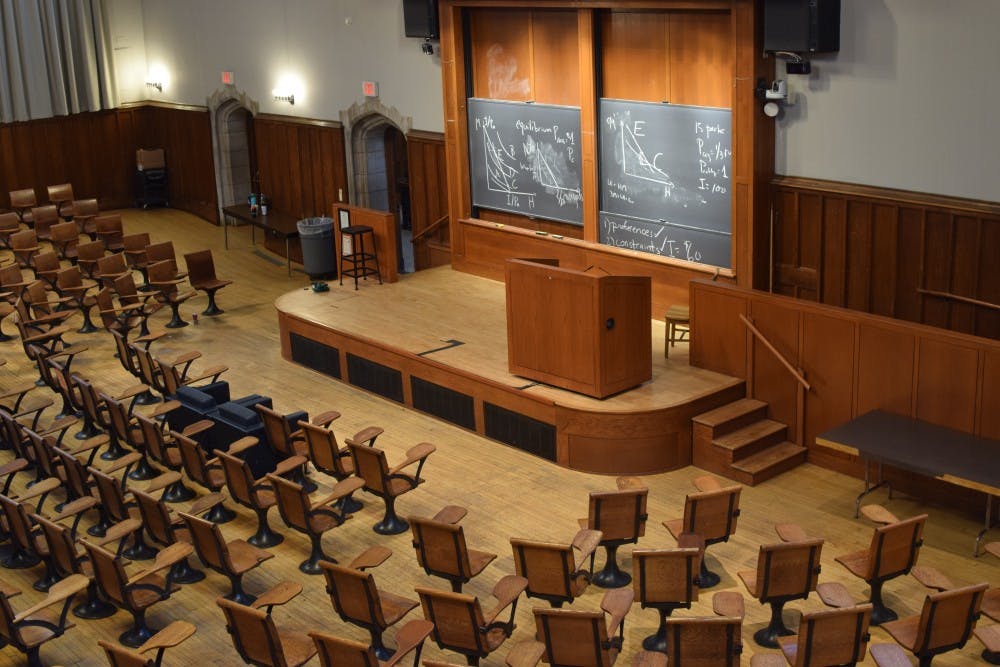The 12 of us are wedged in small chairs, arranged in a casual semi-circle, facing the lecturing professor. Finally, he turns to us, asking a question. A few hands rise up into the air, and then one of us speaks. The hands go back up. Someone replies. The hands go up again. Someone else chirps in.
The “discussions” never last very long.
Since our very first days in orientation, faculty and peers alike have lauded Princeton’s top-tier liberal arts education, a hub where diversity meets intellectual curiosity. In many respects, Princeton has delivered on this promise, offering a spectrum of limitless opportunities, from funded trips abroad to leading research on campus.
However, this ideal also envisions classrooms as bridges between countless disciplines, brimming with enthusiastic, focused discussions that widen all of our mindsets. In this ambitious regard, the liberal arts dream falls short. The resultant conversations often feel forced, limited, and disconnected.
In my view, the solution lies in the smallest of changes: eliminating hand-raising from precepts and seminars.
All too often — from my experiences and those of my peers — we stick to a predetermined agenda, leaving little room for genuine exploration. Professors often speak significantly more than students, and each topic only receives a few comments. Hands remain outstretched in the air even while others are speaking, and comments jump between entirely different topics. Conversely, ignored hands and potentially insightful additions are passed over. We rarely listen to or build off each other’s contributions.
Given the current state of our precepts and seminars, what can we do to revive the intellectual conversations so often touted by the University? How can we reform our discussions to achieve a liberal arts education, engaging full-heartedly with our fellow peers? What we need most is for professors to take a step back in discussions, mediating instead of leading or dictating.
Rather than propose an elaborate system, I believe a simple, yet powerful, solution exists: let’s eliminate hand-raising. Discussions should be free-flowing exchanges — raising our hands creates an obstacle. Discussions should be shaped by curiosity — but raising our hands grants that power to the professor. Discussions should be spontaneous — but raising our hands stagnates any conversation.

Without hand-raising, we would begin to learn from each other. Instead of patiently waiting for our raised hands to be recognized, focusing on our own future comments, we would concentrate on our peers. The invaluable insights, otherwise passed over as an unseen hand, would add to the conversation’s complexity and nuance.
Most intuitively, the conversation would flow more smoothly, focused in scope as we would engage in a natural back-and-forth. We would be excited again, knowing that our ideas would be fully considered by our classmates, and that all perspectives could contribute equally.
Understandably, there is the risk that certain students might overshadow the discussion. In order to foster collaboration and diversity, we must ensure that such collective endeavors do not descend into chaos. Such a worry, however, neglects the conversational collaboration in which we engage every day. From board-room conferences to dinner discussions, we never raise our hands.
In discussing new strategies or the latest impeachment scandal, we ought to listen carefully and discuss respectfully. Our academic discussions should mimic the conversations we will encounter for the rest of our lives. They should teach us how to disagree agreeably, how to consider all perspectives, and how to build off each other without intervention from any outside agent.

In a classroom without hand-raising, the conversations can naturally form without any one professor deciding the direction. Any bias or preference the professor may have, especially towards certain opinions or contributors, will not dominate the discussion.
Instead, the conversations would allow students to form genuine relationships with each other, understanding and fully considering the experiences of their peers without any external influence. The discussions will be created by — and for — students.
This is not to say that the roles of professors should be disregarded; the faculty at Princeton are leading scholars, and, as such, their research and teaching are undoubtedly valuable towards furthering our education. Their lectures and insightful comments always push us to reconsider our own views, often fundamentally challenging our most intrinsic beliefs.
But Princeton is also a liberal arts institution, and as much as we spend our days learning new content and being pushed by our professors and preceptors to consider new views, we are also encouraged to think for ourselves. We’re encouraged to build from the incredible diversity of our peers on campus and discuss from our varied perspectives, preparing us for discussions and conversations that will occur well beyond our four years here. When professors guide and facilitate, they serve as resources — as opposed to interrogators or lecturers — in a genuinely collaborative endeavor.
Though the balance between challenging us with new theories and giving us the opportunity to truly engage in genuine discourse is delicate, it must be met. Let’s create a pedagogy that places the student at the center. Let’s stop raising our hands.
Kate Liu is a first-year from Princeton, NJ. She can be reached at kateliu@princeton.edu.








